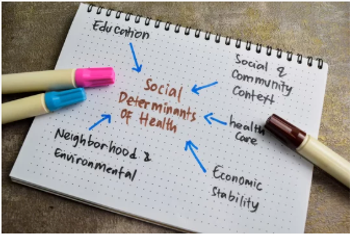
A multistakeholder study explores how law enforcement presence in EDs affects survivors of violence and outlines trauma-informed, patient-centered policy solutions.

A multistakeholder study explores how law enforcement presence in EDs affects survivors of violence and outlines trauma-informed, patient-centered policy solutions.

Coverage of our peer-reviewed research and news reporting in the health care and mainstream press.

Socioeconomic and demographic factors influenced amputation and recurrence rates in upper extremity soft tissue sarcoma.

Semaglutide shows promise in improving liver health and metabolic outcomes in MASH, enhancing steatohepatitis resolution and cardiometabolic measures.

A review of case studies found that patients with double seronegative myasthenia gravis (MG) had similarities in the ways their condition presented.

Few adults with diabetes in Mexico achieve combined CVD risk factor control, highlighting gaps in blood pressure, cholesterol, and glycemic management.

A study shows that PF impacts sexual activity physically and emotionally, emphasizing the need for holistic patient care and quality-of-life assessments.

CSU significantly impacts family quality of life, revealing the need for comprehensive care and support for both patients and their caregivers.

The CEOs of UnitedHealth Group, CVS Health, Elevance Health, The Cigna Group, and Ascendiun attended hearings in the House of Representatives all day Thursday.

New research reveals gut microbiome changes in children with obesity signal liver disease progression, offering insights for early detection and intervention.

Oral nalbuphine significantly reduced cough frequency and severity in idiopathic pulmonary fibrosis (IPF), with patients seeing greater benefit at higher doses.

A new study finds law enforcement presence in emergency departments may disrupt care. Lead author Prashasti Bhatnagar discusses policy and training solutions.

Chronic skin diseases like psoriasis and AD are linked to high smoking and other addiction rates, highlighting the need for integrated psychosocial support.

Patients with severe alopecia areata showed significantly elevated systemic inflammatory markers compared with mild disease and healthy controls.

Sleep-focused TNX-102 SL delivered significant benefits in a phase 3 fibromyalgia study.

Initiating SGLT2is was linked to lower risks of chronic kidney disease and fewer acute kidney injury events than GLP-1 RAs in metformin-treated type 2 diabetes.

A single-center study found it was rare for patients with soft tissue sarcoma to have a complete set of MRI imaging.

The new Horizon1000 partnership aims to deploy AI tools across 1000 clinics to boost care, support health workers, and address aid cuts in African health systems by 2028.

A new bipartisan funding bill funds key departments ahead of the deadline in an effort to avoid another government shutdown.

IGHV-unmutated CLL comprises 2 distinct epigenetic subtypes with different B-cell maturation signatures and genetic alterations, a study found.

Patients with psychiatric disorders had higher CRC risk but no increase in CRC-specific mortality.

A systematic review reveals that cardiovascular risks emerge early in chronic kidney disease, highlighting the need for tailored management strategies.

Explore the evolving GLP-1 landscape with insights from industry experts, shaping future health strategies and plan designs for employers.

Minimizing the use of corticosteroids in clinical practice can help to prevent any long-term impact on patients with myasthenia gravis.

Phase 2a data show oral GRI-0621 was safe and improved immune and fibrosis biomarkers, supporting disease-modifying potential in IPF.

Explore the complexities of modern oncology, including precision medicine, CAR T-cell therapies, and challenges in breast cancer care and payer friction.

The decline in primary care providers threatens Medicare FFS patients' access to new visits, highlighting urgent needs for policy reform and workforce solutions.

Dyslipidemia significantly impacts cardiovascular risk in chronic kidney disease, necessitating tailored lipid management strategies for optimal patient outcomes.

NAMI's National Director of Government Relations and Policy, Jennifer Snow, MPA, explains how advocates rallied in support of mental health care.

The CDC reveals current vaccination trends for COVID-19, flu, and RSV during the 2025-2026 respiratory virus season, highlighting public adoption rates.

259 Prospect Plains Rd, Bldg H
Cranbury, NJ 08512
© 2025 MJH Life Sciences®
All rights reserved.
